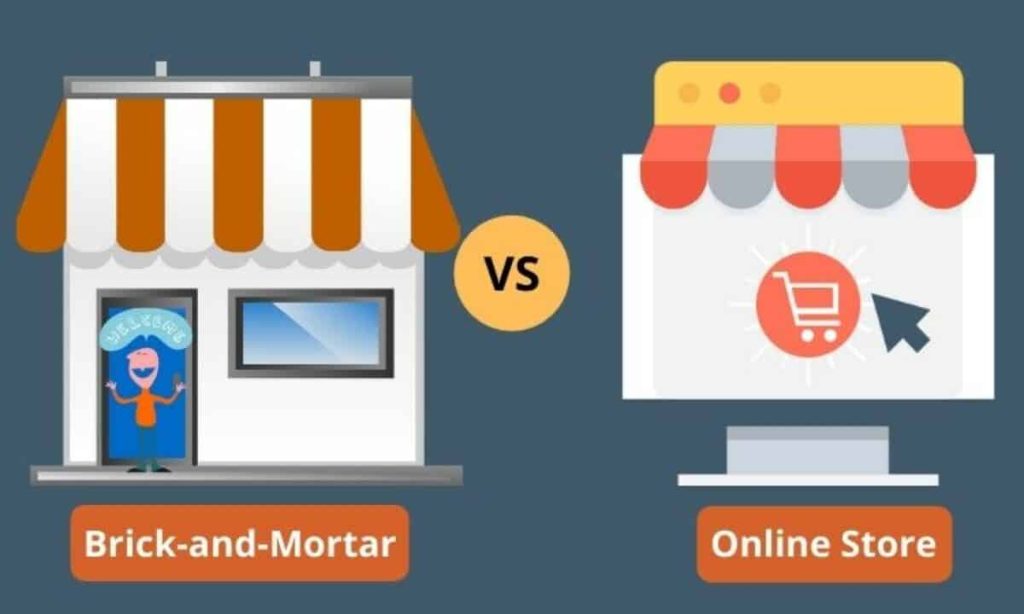Both land-based and online stores often fall into the same category, i.e. commerce, as they offer the same thing to each customer. While both channels are used for shopping, they offer varying experiences to your prospects. Let us explore the differences between brick-and-mortar vs online stores in this article.
Think about it – shopping from a brick-and-mortar store is a little inconvenient since customers are supposed to travel all the way to the retail store, and explore the collection to find their desired product. At the same time, conventional shopping allows your audience to check goods in person and have better communication with the owner.
Brick-and-Mortar Vs Online Stores – Explained in Detail

Is it the End for Brick-and-mortar Stores?
Land-based or eCommerce – which one is the best? It has always been a debatable question, but things have changed a lot since 2020. More and more people are now shifting to eCommerce shopping, as safety becomes their top priority. The lockdowns forced retailers to adapt to eCommerce marketing overnight. Even those who didn’t have a website for their store had to embrace this digital marketing shift to keep their business alive and running. So, does that mean it is an end for the brick-and-mortar stores? Well, not yet!
According to the data published by Groupm, approximately 25% of total retail sales will be processed online. That’s a huge transformation, there’s no denying that. However, it also gives peace of mind to the small retailers who depend on their brick-and-mortar stores solely for sales. 75% of people will continue to buy things from brick-and-mortar stores, which means there is no need for winding up your business just yet.
While both online stores and land-based shops have the same purpose – to achieve customer satisfaction, each method comes with its share of pros and cons. Let’s explore each one in detail.
Brick-and-mortar Stores
Physical interaction. That’s the biggest advantage of the brick-and-mortar store. These stores allow you the in-person shopping experience, which is not possible with digital marketing. The traditional marketing approach allows your audience to interact with the brand in a more meaningful way than through media.
eCommerce is not always the best option for your business. Suppose you have a business of women’s, men’s and kid’s shoes. Your business is doing great. You want to take your business to the eCommerce sector to increase sales. But, is it really a good option? Customers prefer buying shoes at the brick-and-mortar store, as a vast majority of people don’t know their shoe size. Similarly, customers are often hesitant to buy cosmetics, apparel, and accessories. What if the colour and design of the real product are different from what’s shown on social media or eCommerce stores.
ECommerce Shopping
No physical setup, no storage requirements, little maintenance fees, and a lot of convenience and flexibility. These are a few things that make eCommerce a viable and lucrative option for both merchants and customers. We have seen tremendous growth in the eCommerce industry in 2022. This industry was flourishing before the pandemic, but the sudden COVID outbreak took eCommerce to a whole new level.
Gone are the days when you had to visit different retail stores to find the product you are looking for. Now, people love the convenience of online shopping. Who wants to spend their time and money on travelling when you can have your selected products delivered to your doorstep? Besides, the popularity of eCommerce shopping has skyrocketed after the pandemic.
The best part about the eCommerce business model is that it comes at a reasonable cost. This low-cost business model has proven to be a lucrative option for those with an excellent startup idea. If you can’t raise capital for your brick-and-mortar store, you can start online. It is a wonderful way to reach out to a large audience through different channels and at a minimal cost.
So, Which One is Better?
Both options come with their share of advantages and disadvantages. Here are a few things a retailer should consider before making a choice between brick-and-mortar and online stores.
- Type of Products
The nature of your business is an important consideration. People may buy groceries and other regular use items online, but when it comes to luxury products, people need the in-person shopping experience. They don’t make an impulse decision when buying goods that are worth $1000 and more. They might check out these products online, but there is a good chance your customers will schedule a visit to your brick-and-mortar store to check the product personally before making a purchase.
- Budget
Not everyone has the budget of setting up a brick-and-mortar store. It can cost a fortune. eCommerce store, on the other hand, has a very reasonable setup cost and anyone can get started with their business idea.
- Marketing
Traditional marketing has almost died. No matter the size and nature of your business, you need to have your business listed on Google My Business and social media to get found easily. Digital marketing has a great scope, considering the current popularity of these robust marketing tactics. You can have your business up and running on social media to build a strong brand presence. In addition, you can adapt to different marketing channels, such as email marketing, search engine marketing, and more.
- Customer Experience
The success of any business relies totally on the customer experience. It’s important to adapt your business model to your customers’ requirements and expectations. Customers are looking for a personalized experience. They prefer doing business with a company that caters to their individual requirements.
People are highly likely to abandon a cart if they don’t get an immediate response to their queries. You may be a one phone call or email away, but it can’t be compared with the in-person shopping experience where your customers can have their issues fixed immediately.
Bottom Line
There are a lot of things to consider before you decide between a brick-and-mortar store and an eCommerce store. It’s better to start small with an Ecommerce store and expand your business gradually to the physical business model. Or, if you already have a land-based store, consider taking it to the digital channels.







